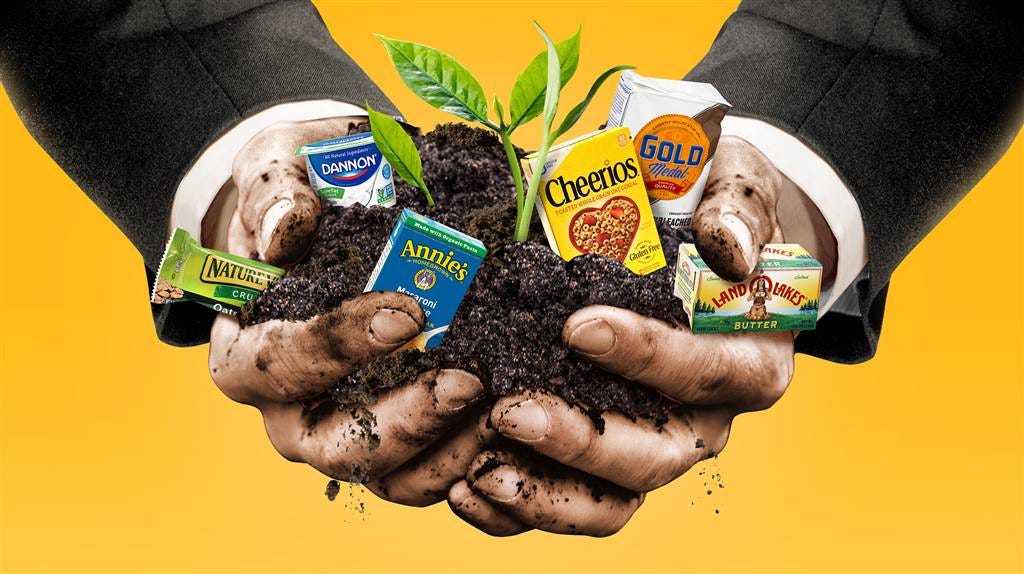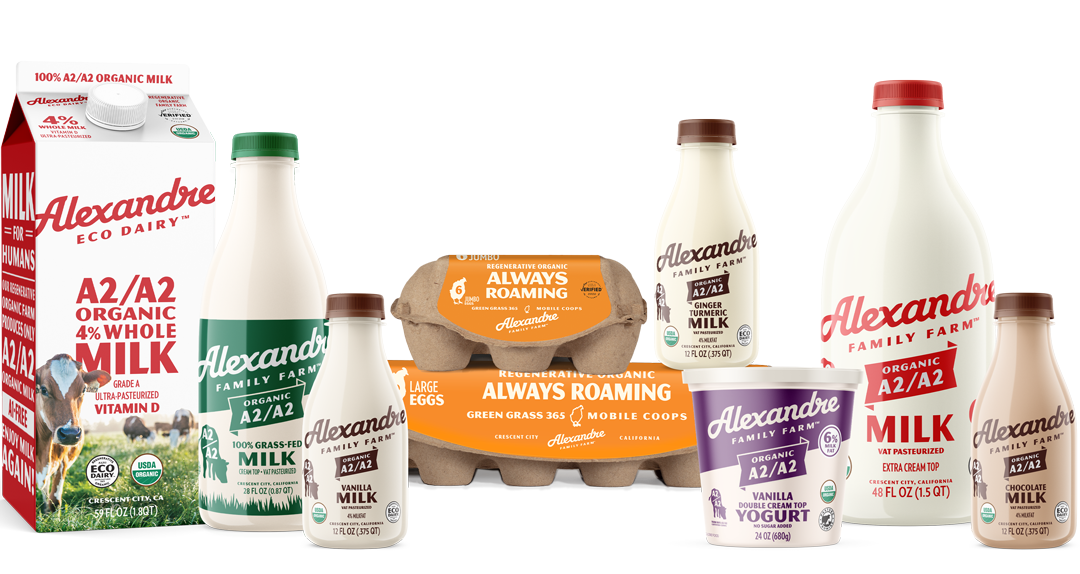🐮 Is regenerative agriculture becoming Big Food’s new cash cow?
Progress: It is no secret that our centralized food system grants a large amount of influence to a small number of packaged food corporations like Mars and Nestle. These manufacturing giants make daily decisions about where to source ingredients, which not only determine what large, medium, and small farms across the globe plant but also how they grow it. In the past, ‘Big Food’ - a catchall term for firms that dominate the production and distribution of food and beverage - notoriously made procurement decisions that perpetuate the problems of an industrial food system. But in recent years, an increasing number of food corporations have turned their attention towards sustainable farming initiatives that aim to reduce their carbon footprint while enhancing supply chain resiliency.
In 2016, General Mills, the world’s fourth-largest producer of organic and natural foods, took the lead by working with The Nature Conservancy (TNC) to develop the first Soil Health Roadmap, which laid out a 10-step path to building healthier topsoil across US croplands. The company has since committed to advancing regenerative agriculture practices on one million acres of farmland (roughly the size of the Grand Canyon) by 2030. Danone North America is not far behind. In 2018, the packaged food and beverage company commited $6 million to research regenerative agriculture and soil health. Soon after, Danone brought together 19 corporations, including Kellogg and Nestle, to launch the One Planet Business for Biodiversity (OP2B) coalition. The cohort of brands is unified under a shared mission to rebuild biodiversity and eliminate deforestation within their supply chains. And in 2020, McDonald’s and Cargill - two names associated with industrial animal agriculture - joined forces with TNC and Target to debut an $8.5 million project focused on advancing sustainable practices. Over the course of five years, this group will help Nebraska producers incorporate regenerative principles across 100,000 acres of cropland.
Yet the question still remains: Is pushing for regenerative practices by the world’s largest food manufacturers an attempt to reverse climate change or just another subtle attempt to sell more products? While we must be vigilant of greenwashing, we cannot discount the opportunity Big Food has to accelerate the shift towards a more regenerative food system by:
1) Integrating technology: Large food companies have the capital to back long-term sustainability efforts - and put the right technology in the hands of producers across North America. Land O’Lakes - the dairy and animal feed behemoth - is increasing soil health across 300,000 acres of US-grown corn by equipping farmers with TruTerra. The software platform manages sustainability programs - such as no-till cultivation, precision nutrient management, and cover crop planting. Meanwhile, Stonyfield Farm - an organic dairy company - is scaling a $10 million initiative with OpenTEAM to develop technology that monitors soil health and provides farmers with regenerative agriculture recommendations. And in 2019, eleven private-sector companies and nonprofits unveiled the Ecosystem Services Market Consortium (ESMC). The goal of the organization is to develop protocols and a related technology platform designed to sell ecosystem assets - such as carbon and water quality - for the agriculture sector by 2022.
2) Supporting farmers in transition: The challenge for any farmer trying to shift away from the industrial model is the risks associated with removing chemical inputs. In 2020, General Mills began working with Foremost Farms to announce a three-year regenerative dairy program in western Michigan. Understanding Ag, a consulting firm that advises farmers on regenerative land management - was brought in to offer free one-on-one coaching. Companies can also help farmers weather the time it takes to transition their techniques by guaranteeing a market for regenerative products.
3) Increasing consumer awareness: In 2019, Whole Foods declared that regenerative agriculture was one of the top food trends for 2020. At the end of the day, it is up to consumers to decide if they care enough about the environment and animals to pay a premium for sustainable goods. But corporations can do their part by using their reach and economies of scale to educate shoppers with product portfolios that showcase regenerative terms and techniques. Take, for instance, Kernza, a perennial grain developed by The Land Institute. This new cover crop gained mainstream notoriety after Patagonia Provisions brewed it into a Long Root Ale. Soon after, General Mills sourced the grain for its line of Cascadian cereal.
In short, companies like General Mills and Danone are aware of the clear and present impact that climate change could have on their global supply chains. As strange as it sounds, the same stakeholders that degraded US cropland for decades are now in the unique position to offer producers in their supply chains the educational resources, technical assistance, and financing necessary to drive systemic change within our food system. As the interest in sustainability grows, data will be a necessary next step to validate the efficacy of new land management practices. Thus, getting large-scale players to work alongside nonprofits, farmers, investors, and activists may be the missing link to scaling regenerative agriculture efforts.
Watch: In this four-part series, host Chris Kerston explores the farmers and ranchers who are fighting to shift the way that animal products are raised and produced. The group of forward-thinking producers is ushering in a new era of sustainable production through “Holistic Management.” The videos were produced by the Savory Institute, a nonprofit on a mission to promote large-scale restoration of the world’s grasslands through managed grazing efforts that mimic nature. Check out the link to learn more about the new generation of meat, wool, leather, and dairy producers harnessing the power of nature to create a positive ecological impact while supporting themselves and their community.
Shop: 4th generation dairy farmers Blake and Stephanie Alexandre have always focused on the health of their ecosystem – from the organic matter in the soil to their cows and the wildlife around them. Today, Alexandre Family Farm is the first regenerative organic dairy in the US certified by both the Regenerative Organic Alliance and the Savory Institute. In addition, the dairy only produces 100% A2/A2 organic milk from their herd of carefully crossbred cows. Located on the northern California coast, the grass-based farm is owned and run by the Alexandres and their 5 children and spouses. The company offers exceptionally delicious and nutrient-dense cream-top milk, yogurt and eggs west of the Rockies, and has just introduced national distribution of milk in a gable-top carton. Click the link to find a store that carries their line of animal products near you!
The Regeneration is brought to you by PastureMap | Soilworks | Wholesome Meats.




Big food companies will simply not make this shift until we have a sweeping farm bill reform and food policy changes to our subsidies. To transform from conventional agriculture to regenerative agriculture requires an ethical and cultural shift. This shift threatens and challenges the premise of capitalism. It is great to see companies acknowledge that this is the trend and that economy is tied to ecology. However, if this transition is only seen through the lens of profit, it will never be realized.